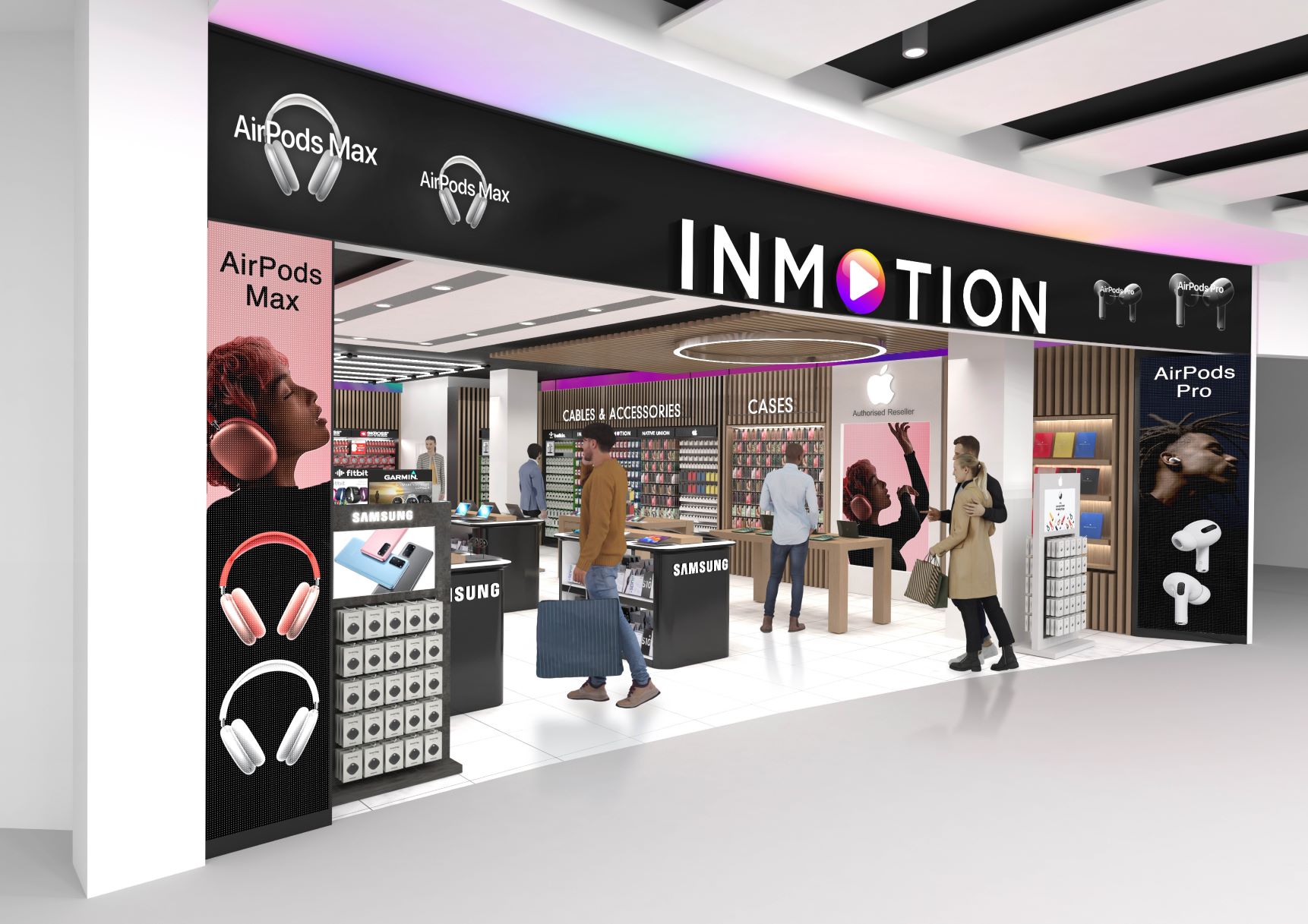The first year of the pandemic was bad news for many retailers, but those who sold consumer electronics had the benefit of being designated essential businesses, which allowed them to remain open and sell all those video game consoles, laptops, and other stay-and-work-at-home tech that COVID-era consumers snapped up en masse.
Not so for stores located in airports, hotels, casinos, resorts, and other travel hubs. With air travel and hotel stays plummeting in 2020, it was a tough year for airport retailers, which suffered a 60 percent year-over-year drop from April of last year to April 2021, according to Coresight Research. Still, those travel retailers with deep pockets — and patient, visionary leaders — were able to lean into the pandemic, and are better poised to reap the benefits of a renewed interest in travel. (That same Coresight report estimates that airport retail sales will grow by $10 billion this year versus 2020.)
Case in point: InMotion, which sells everything from headphones and laptops to smartwatches and cable accessories to travelers in its 120 planeside stores, mostly in the United States and Canada. Though it had to close all of its stores in April 2020 for a couple of months, and even closed two stores for good in 2020, it is now in growth mode, replacing any shuttered outlets and then some with new locations.
Acquired by W.H. Smith in 2018, InMotion, which got its start in 1997 in Seattle and Minneapolis as an airport portable DVD “rent-tailer,” is now not only on a global expansion, but also moving beyond airports to hotels, resorts, and casinos. It helps, of course, that InMotion is a key part of parent company W.H. Smith’s airport retail strategy. Right before the pandemic, in late 2019, the British book and retail behemoth also purchased Marshall Retail Group (MRG), which operates more than 160 convenience stores in airports and hotels around the world. But instead of falling apart with what might have seemed like bad timing, W.H. Smith leaned into the comparative “downtime” of the pandemic and worked on fusing the two acquired businesses, while letting each focus on its respective strengths.
“Rarely do you get to work on a business when you’re not actually making sales,” Eden Goldberg, vice president of marketing and business development at InMotion Entertainment Group, told Dealerscope. “So we made use of this period to be very strategic and find best practices. We looked at our priority list of projects and actually got to them. This included everything from streamlining some operational processes to merging some of our shared departments with our sister company MRG. This didn’t only lead to cost efficiencies, but [also to] an overall stronger larger business. We’re also looking at a wider portfolio of retail solutions for many different travel shopping environments.”
The result? InMotion is not only supplying electronics inventory to existing MRG convenience stores, but is also expanding its brand into some existing MRG locations in hotels and casinos, including at the Forum Shops at Caesar’s Palace and Harrah’s in Las Vegas and the Seminole Hard Rock Casino in Fort Lauderdale. After all, travelers need headphones, speaker systems, action cameras, and cable accessories once they’ve arrived at their destinations as well as en route.
What’s more, the heretofore mostly U.S. InMotion brand is set to expand into additional international markets as well, with two new locations opening in Alicante, Spain and Berlin, Germany (as soon as that city’s new international airport is completed). And in July, the company announced that it would be opening stores in 18 airport locations throughout the U.K., including Heathrow and Manchester, that were recently vacated by Dixons Travel Stores. This is hardly a retailer that is surrendering after a tough year.
Besides the overt expansions into new markets, InMotion has evolved with a changing customer base. Younger leisure travelers on a budget and a broader spectrum of work-from-home travelers have grown in number, so the stores no longer cater only to business travelers with premium tech needs and the financial wherewithal to acquire it. So, in addition to the requisite mice, portable keyboards, and laser pointers, InMotion has moved into more entry-level earbud and headphone categories, as well as health and wellness wearables such as portable air purifiers, percussive massagers, Apple Watches, FitBits, and more.
Since travel consumers have specific needs, InMotion has capitalized on bundling beyond specific products. So instead of just selling someone a Bluetooth headphone, InMotion’s salespeople are trained to educate consumers that they’ll also need a traditional audio cable or Bluetooth transmitter to use the airplane’s in-flight entertainment system. “We’ve really gone beyond not just qualifying the consumer’s need for the trip, but to finding an all-in-one solution for each customer,” says Goldberg.
It’s not quite an upsell, however. Educating and making tech easier for travelers has always been in InMotion’s DNA. “So many of the products we carry are unboxed, charged up, and ready to be used,” says Goldberg. “If we sell you a tablet or an Apple Watch, we’ll set it up for you with the right band and charger and insert a SIM card for you. If you buy a GoPro, let us at least teach you the 101 so that you don’t have to sit there with the instruction guide and hope you can figure it out on your tray table. That’s also part of the solution-based concept we offer.”
As with so many a lasting brick-and-mortar store in today’s increasingly omnichannel environment, InMotion’s secret to retail excellence often boils down to old-fashioned customer service.
For more, read our full interview with InMotion’s managing director and SVP, Pete Newbould, and VP of marketing and development, Eden Goldberg, under the Travel tab.















